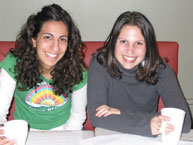Let's get going: Jewish and Arab youth unite with Yalla
Let's get going: Jewish and Arab youth unite with Yalla McGill University
User Tools (skip):
Let's get going: Jewish and Arab youth unite with Yalla
When Yalla first appeared in January 2004, 2,500 copies were distributed. They were left in resource centres, in cafes, and on park benches. The journal, which resembles a book, offers a peaceful and productive outlet for creative expression and discourse on the Israeli/Palestinian conflict.

Yalla Journal editors Rasha Srouji and Rachel Davidson discuss their next issue's content.
Erica Zelfand
Primarily a student-fueled project, Yalla strives to promote awareness and discussion about the situation in Israeli/Palestinian without the use of bias, propaganda, hatred or violence. "The idea of the journal is to get at the human side of the conflict," explains Rachel Davidson, a U3 Hispanic studies student and Jewish editor of the journal. "Through people's words and art and photography we're hoping that any person can pick up the journal and find something written by someone from the 'other side' that they can relate to."
Rasha Srouji, a U1 nursing student and Arab editor of the journal added, "We're trying to prove that if both communities can work peacefully here, there is hope for something to happen in Israel/Palestine."
Davidson and Srouji are but two of the six hard-working editors of Yalla Journal: three are Jewish and three of whom are Arab. "We represent both Arab youth and Jewish youth - the future of relations. We work together even though we don't all share the same opinions, but we're a model for what successful relations can be," explains Davidson.
Since its launch in 2004, Yalla has had great success in inspiring dialogue. It has also won the Forces Avenir Award for its commitment to the enhancement of peace and justice.
Perhaps the success of the journal may be attributed to its dialectic approach. Unlike a verbal discussion group or debate, Yalla targets the individual: "You can read it alone and have your own opinion and feelings, without having to publicly state anything," says Srouji. Davidson adds, "When you read the journal you're forced to listen to the other side." After thinking for a moment and chuckling, she says, "and you also have the freedom to throw the book across the room."
Submissions are written by Canadian youth ages 18 and 30 who have somehow been personally affected by the situation in Israeli/Palestinian (contributors are not necessarily Jewish or Arab). "We're not looking for political essays on a one- or two-state solution. We're looking for information on how the conflict affects individual people," says Davidson. Steering clear of "political science essays," the editors hope, will help them avoid the trap of "preaching to the converted."
"True activism," explains Davidson, "is trying to reach those people who don't necessarily share your opinion. In doing so you expand their world and yours at the same time." Because the primary goal of Yalla is to get groups talking to each other, articles are printed in a ratio of one Jewish contribution to one Arab contribution.
Srouji explains that the editorial board does not have to agree with a piece for it to appear in the journal. Furthermore, submissions are not edited, although some are denied. "Anything that incites violence or hatred toward a targeted group is not published," explains Srouji. The editors are also adamant about making the journal free: "It puts a bar on who you can reach if you put a price on a journal of this nature - our philosophy is all-inclusive," says Davidson.
"Yalla" is a colloquial phrase used in the Middle East to say, "Let's get going!" When an editor suggested the name, there was confusion over whether the phrase was of Jewish or Arabic origin. This confusion, caused by the popularity of the phrase in both communities, was a sign to the editors that the name was perfect. Davidson explains, "Yalla is an interesting word because it proves the power of words to cross bridges, which is exactly what we represent."
For more information, or to download a version of the current issue of Yalla Journal, visit www.YallaJournal.com. Email submissions before February 20 to: YallaJournal@yahoo.com.

